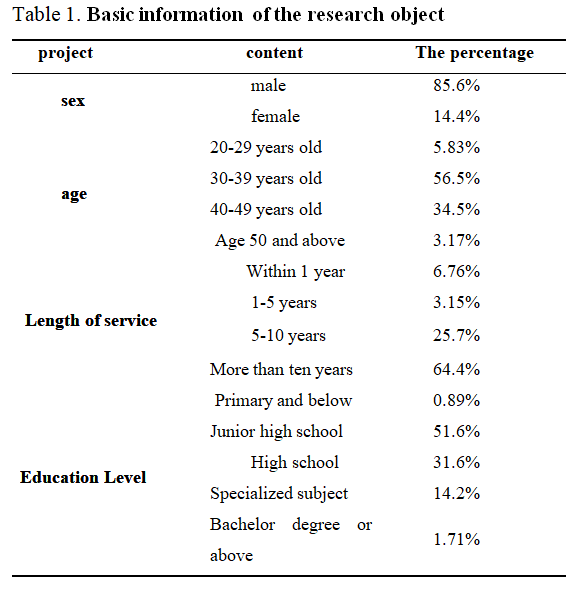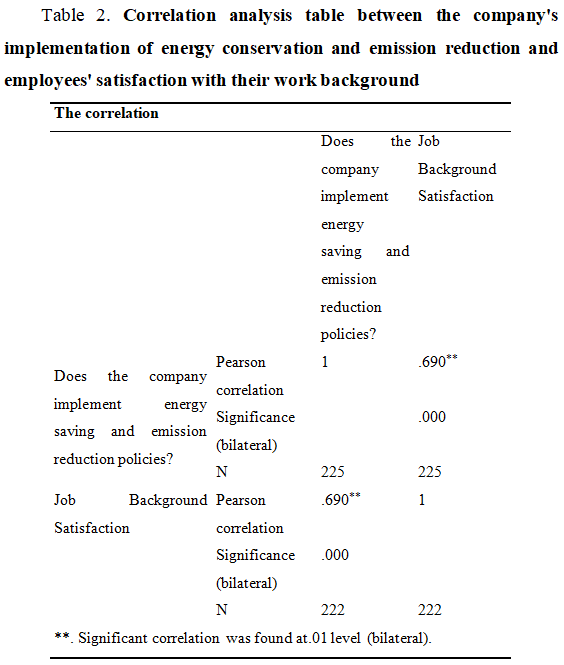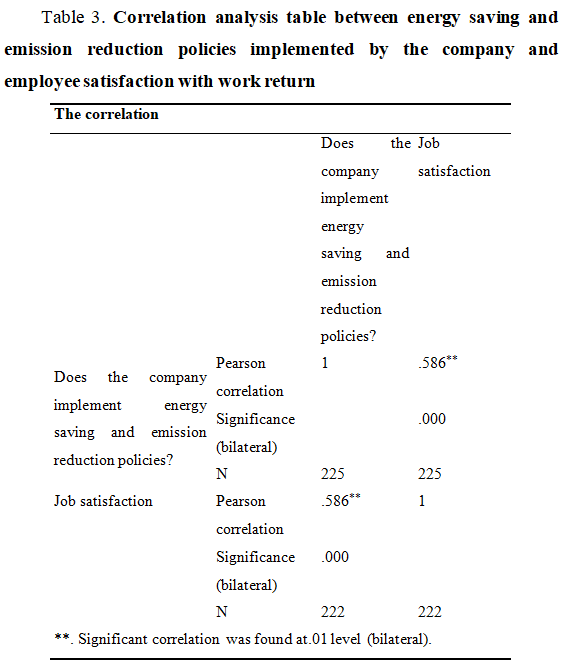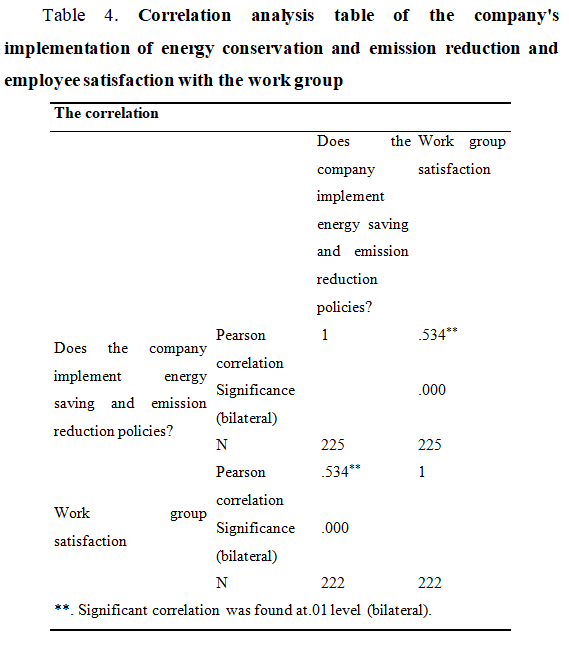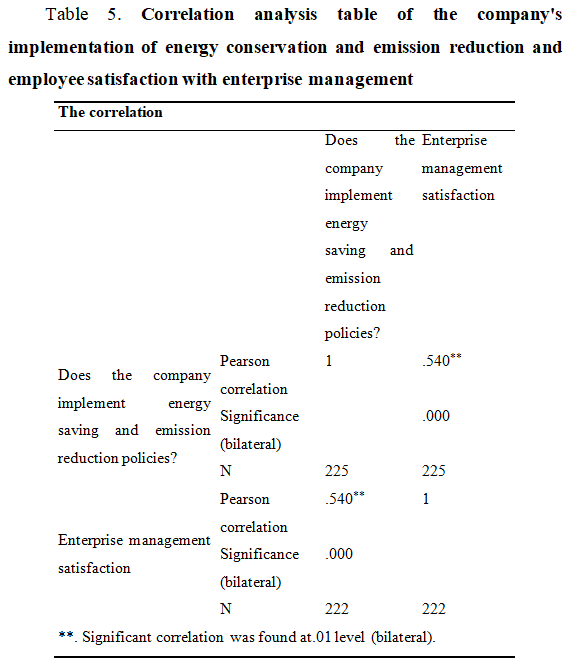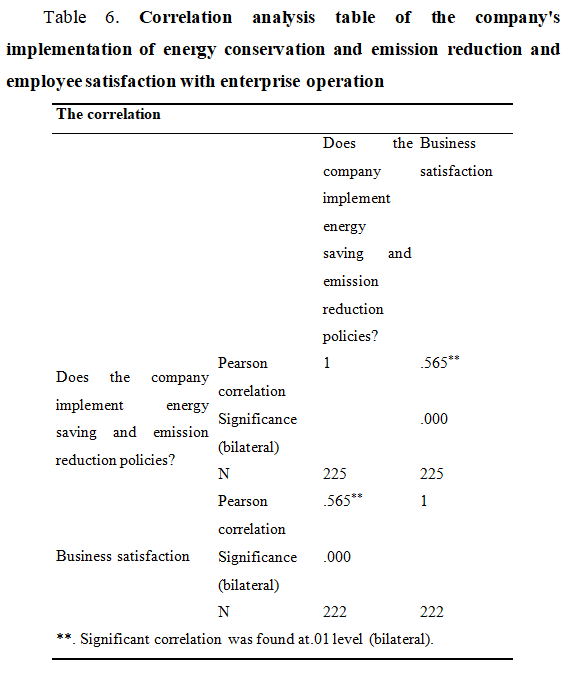Научная статья
Original article
УДК 658.3
doi: 10.55186/2413046X_2022_7_6_368
THE INFLUENCE OF ENTERPRISE ENERGY CONSERVATION AND EMISSION REDUCTION GOVERNANCE ON EMPLOYEE SATISFACTION
Yu Zhaoyan, postgraduate student 2 years of study, Smolensk State University, Russia, Smolensk, E-mail: 87901882@qq.com
Abstract. Energy conservation and emission reduction are important ways and means to promote China’s economic restructuring and transformation of growth pattern. As a participant of social and economic development, enterprises are important subjects of energy conservation and emission reduction, and employee satisfaction is a key factor affecting the production and operation efficiency of enterprises. Therefore, this paper discusses the impact of energy conservation and emission reduction on employee satisfaction from five dimensions: employee work background, work return, work group, business management and business operation. The research shows that there is a significant correlation between the implementation of enterprise energy conservation and emission reduction policies and the working environment, work return, work group, enterprise management and enterprise operation, which indicates that the implementation of enterprise energy conservation and emission reduction policies can effectively promote the improvement of employee satisfaction. Based on this, this paper proposes that in the process of economic development, through reasonable and effective measures to save energy and reduce emissions to enhance employee job satisfaction, so as to improve their work effectiveness and efficiency and promote their sustainable development.
Keywords: energy conservation emission reduction, Employee satisfaction, Enterprise development
1. Introduction
The report to the 19th National Congress of the Communist Party of China put people first and pointed out that socialism with Chinese characteristics has entered a new era. We will always put the people’s interests above all else, ensure that the fruits of reform and development benefit all the people in a more equitable way, and ensure that their sense of gain, happiness and security are more substantial, secure and sustainable. Enterprises fulfill their social responsibility is the requirement of their sustainable development, and energy conservation and emission reduction is the necessary path for enterprises to undertake their social responsibility. At the same time, protecting the interests of employees is also the requirement of undertaking social responsibility. Scholars have done a lot of research on energy saving and emission reduction and promoting enterprise development. Guangdong Tabai Group (2012) found that energy conservation and emission reduction is a new driving force for enterprise development. Taking the implementation and management methods of energy saving and emission reduction as an example, this paper discusses the management system suitable for the company. By defining and formulating corresponding management responsibilities and working procedures, the company has laid a solid foundation for the development of green environmental protection, and improved the operation efficiency and economic benefits of the company. Fu Yuanping and Wen Lin (2012) took the implementation and management methods in energy conservation and emission reduction of enterprises as an example to discuss the management system suitable for the company. By defining and formulating corresponding management responsibilities and working procedures, the company has laid a solid foundation for the development of green environmental protection, and improved the operation efficiency and economic benefits of the company. Jiang Guogang (2019) proposed that petrochemical enterprises should strengthen main responsibility, attach importance to safety management and promote technological innovation to achieve green industrial upgrading. Wang Minjie et al. (2020) put forward that the internal enthusiasm of energy conservation and emission reduction can be mobilized by mobilizing all aspects. Accelerate breakthroughs in key technologies in clean energy and low carbon, and promote win-win economic and social development and environmental protection; Jiang Zhe (2020) proposed feasible measures for energy saving and emission reduction, aiming to improve the energy saving level of enterprises and help the sustainable development of social and ecological benefits. Tang Tianwei et al. (2020) showed through the empirical analysis of Hefei Economic Circle that only by continuously improving the level of regional economic development, continuously optimizing the industrial structure and attaching importance to technological innovation of energy conservation and emission reduction can regional ecological environmental quality be effectively improved. Cao Yuting et al. (2020) proposed that the improvement of industrial casting technology can reduce the discharge of hazardous wastes to enterprises, improve employee satisfaction and bring enterprise benefits. Scholars have conducted a lot of studies on promoting environmental improvement and enterprise development through energy conservation and emission reduction, and achieved fruitful results. However, there are few studies on improving employee satisfaction through energy conservation and emission reduction. How the implementation of energy conservation and emission reduction will affect the satisfaction of internal employees is an important research direction for enterprises. Because employee satisfaction has a great impact on the operation of an enterprise, improving employee satisfaction will effectively promote the development of the enterprise. This paper studies the influence of energy conservation and emission reduction on employee satisfaction from five dimensions, and puts forward reasonable suggestions for improving employee satisfaction based on energy conservation and emission reduction, so as to provide corresponding theoretical basis for the implementation of energy conservation and emission reduction. Through questionnaires and interviews with employees and management, we can obtain real information from multiple perspectives, provide research data for our research report and provide information sources for subsequent data analysis. It also understands the actual situation of energy saving and emission reduction and employee satisfaction within the company from a micro perspective, and qualitatively shows the relationship between energy saving and emission reduction and employee satisfaction. Through analysis of survey data, using the theory of variable analysis, hypothesis test and correlation analysis of a variety of analysis tools, our survey data for quantitative analysis, scientifically rigorous argued that our previous assumptions, for the implementation of energy conservation and emissions reduction policy or want to implement energy conservation and emissions reduction of enterprises to provide more reference opinions and Suggestions.
2. Data Sources
The analysis data used in this questionnaire are from enterprises in Liaocheng, Shandong province. A total of 225 employees filled in the questionnaire, and 225 questionnaires were sent out, of which 222 were effective. The overall recovery rate of the questionnaire reached 100%, and the effective rate reached 98.7%.
- Research data analysis
3.1 Theoretical analysis and hypothesis of research variables
The human-oriented management mode of “people-oriented, high satisfaction” is playing an increasingly important role in the management value system of contemporary enterprises. And the survey of employee satisfaction as the basis of enterprise management can best reflect this management thought. According to the Minnesota Long Degree of Satisfaction Scale, we mainly carried out research from five aspects of job background satisfaction, job reward satisfaction, satisfaction with working group, satisfaction with enterprise management, and satisfaction with enterprise operation.
3.2 Descriptive statistical analysis
3.3 Correlation analysis
Based on the actual research data, the paper carries out correlation analysis on the five dimensions of enterprise energy conservation and emission reduction and employee satisfaction through SPSS software.
3.3.1 The company implements energy conservation and emission reduction and employees’ satisfaction with their work background
According to the table of correlation analysis results between the company’s implementation of energy saving and emission reduction and employees’ satisfaction with work return (R =0.69, P <0.01), it can be found that the correlation coefficient between these two variables is positive, indicating a positive correlation. Moreover, the P value is less than 0.01, reaching the significance level, indicating that there is a significant correlation between the implementation of energy conservation and emission reduction by the company and employees’ satisfaction with their work background, which also indicates that the implementation of energy conservation and emission reduction by the company will improve employees’ satisfaction with their work background.
3.3.2 The company’s implementation of energy conservation and emission reduction and employees’ satisfaction with work returns
According to the table of correlation analysis results between the company’s implementation of energy saving and emission reduction and employees’ satisfaction with work return (r=0.586, P <0.01), it can be found that the correlation coefficient between these two variables is positive, indicating a positive correlation. Moreover, the P value is less than 0.01, reaching the significance level, indicating that there is a significant correlation between the company’s implementation of energy conservation and emission reduction and employees’ satisfaction with work return, which also indicates that the enterprise’s implementation of energy conservation and emission reduction can improve employees’ satisfaction with work return.
3.3.3 The company implements energy conservation and emission reduction and employees’ satisfaction with the working group
According to the table of correlation analysis results between the company’s implementation of energy saving and emission reduction and employees’ satisfaction with the work group (r=0.534, P <0.01), it can be found that the correlation coefficient between these two variables is positive, indicating a positive correlation. Moreover, the P value is less than 0.01, reaching the significance level, indicating that there is a significant correlation between the company’s implementation of energy conservation and emission reduction and employees’ satisfaction with the work group, which also indicates that the company can improve employees’ satisfaction with the work group by implementing energy conservation and emission reduction strategies.
3.3.4 The company’s implementation of energy conservation and emission reduction and employees’ satisfaction with enterprise management
According to the table of correlation analysis results between the company’s implementation of energy saving and emission reduction and employees’ satisfaction with work return (R =0.54, P <0.01), it can be found that the correlation coefficient between these two variables is positive, indicating a positive correlation. Moreover, the P value is less than 0.01, reaching the significance level, indicating that there is a significant correlation between the company’s implementation of energy conservation and emission reduction and employees’ satisfaction with enterprise management, which also indicates that the enterprise’s implementation of energy conservation and emission reduction will improve employees’ satisfaction with enterprise management.
3.3.5 The company implements energy conservation and emission reduction and employees’ satisfaction with enterprise operation
According to the table of correlation analysis results between the company’s implementation of energy saving and emission reduction and employees’ satisfaction with work return (R =0.565, P <0.01), it can be found that the correlation coefficient between these two variables is positive, indicating a positive correlation. Moreover, the P value is less than 0.01, reaching the significance level, indicating that there is a significant correlation between the implementation of energy conservation and emission reduction policies and employees’ satisfaction with enterprise operation, which also indicates that the implementation of energy conservation and emission reduction policies will improve employees’ satisfaction with enterprise operation.
4. Summary
Based on the above relationship between energy conservation and emission reduction in enterprises and the improvement of employee satisfaction, it can be found that there is a significant correlation between energy conservation and emission reduction and employees’ satisfaction with their work background, work reward, work group, enterprise management and enterprise operation. The correlation coefficient between the energy conservation and emission reduction of enterprises and each dimension is positive. In each dimension, the employee satisfaction is very low before the enterprise implements energy conservation and emission reduction. After the enterprise implements energy conservation and emission reduction, the employee satisfaction level of each dimension has been greatly improved. Therefore, there is a significant positive correlation between energy saving and emission reduction and the improvement of employee satisfaction. It also shows that the implementation of energy saving and emission reduction strategies can effectively promote the improvement of employee satisfaction.
The implementation of energy conservation and emission reduction strategies by enterprises will effectively promote the improvement of employee satisfaction, which is a key factor affecting the production and operation efficiency of enterprises. The improvement of employee satisfaction will make employees more active in work, The enhanced sense of belonging to the organization and the prospect and confidence of the future development of the enterprise will affect the performance of the enterprise, improve the production level of the enterprise organization and the operation efficiency, and contribute to the green, sustainable and healthy development of the enterprise.
Reference
- Tapai Group. Exploring “Green Momentum” for Enterprise Development from Energy Saving and Emission Reduction -Guangdong Tapai Group Co., Ltd[J]. Labor Economics Online.2017(13):76-77
- Ling WEI. New Trend of green intelligent building development: user-centered intelligent strategy [J]. Urban Architecture.2018(6):47-50.
- Sun Jingru. Analysis on the importance of employee satisfaction to the development of smes [J]. Industry Forum, 2018(17):258-259
- Research on the relationship between happiness index and economic development [J]. Urban-rural Construction and Development, 2016(27):237-239.
- Wu Aili et al. Research on corporate social responsibility from the perspective of happiness [J]. Hunan Social Sciences, 2014(5):146-149
- Du Hongyan. Discussion on the importance of Domestic cosmetics enterprises to improve customer satisfaction [J]. Brand, 2015(6) : 15-16
- Zheng Long. Evaluation research and Empirical Analysis of Customer Satisfaction [D]. Wuhan: Wuhan University of Technology.2008
- DetertJ R , Edmondson A C . Implicit Voice Theories: Taken for-Granted Rules of Self-Censorship at Work[J]. Academy of Management Journal, 2011(54)
- Morrison E W .Employee Voice Behavior: Integration and Directions for Future Research[J]. The Academy of Management Annals.2011(5)
- Peng Zhengan, Liu Xin, Yang Dongtao. Organizational justice and job satisfaction: The Moderating role of self-construction [J]. Nanjing Social Sciences.2015(02)
- Zhao Tianbao. Research on employee Satisfaction Promotion Strategy of Y Mobile Company [D]. Taiyuan: Shanxi University,2019.
- An empirical study on the impact of corporate culture on employee satisfaction: A case study of P Company [J]. Modern Economic Information.2019(14)
- Qin Hongdan, Ding Fuxing. The influencing factors and improvement path of employee satisfaction [J]. Modern Enterprise.2019(8).
Для цитирования: Yu Zhaoyan. The influence of enterprise energy conservation and emission reduction governance on employee satisfaction // Московский экономический журнал. 2022. № 6. URL: https://qje.su/ekonomicheskaya-teoriya/moskovskij-ekonomicheskij-zhurnal-6-2022-38/
© Yu Zhaoyan, 2022. Московский экономический журнал, 2022, № 6.




